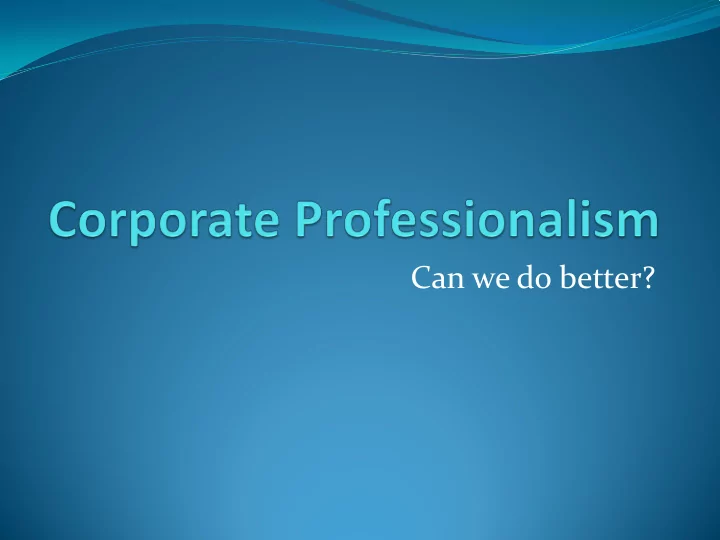

Can we do better?
What is professionalism? Professionalism is knowing how to do it, when to do it, and then doing it. Frank Tyger A professional is someone who can do their best work when they don't feel like it. Alistair Cooke
What is professionalism? Doing the right thing when no-one is looking
Professionalism clinical vs corporate Clinical professionalism Act in the patient’s best interests, unaffected by: our feelings and biases, or the need for external acknowledgement “First time, every time” Corporate professionalism Act in the public’s best interests, unaffected by: our frustrations and beliefs, and when no-one else is checking up on us “First time, every time”
Corporate professionalism within the medical profession Generally very good at looking after our patients Routinely bored by - and dismissive of - administrative necessities Passive about our employers’ key fiscal interests Accept administrative errors that work in our favour Rarely confronted about administrative shortcomings Transmit this overall disregard to the next generation
Late cancellation of clinical commitments Urgent competing clinical commitment Unexpected request for our attendance Failure to remember personal/leave arrangements Late notice is the norm Disruption/distress to our patients – patients do not always come first Disrespect for our clerical colleagues - invariably results in clerical chaos Disregard for the hospital’s/State’s resources – staff and facilities under-utilised
Call-back charges Entrenched in the Award Easy to manipulate Three hours pay for 15 minutes work Call-back from 6pm – 6.30pm is common ?Pay back for extra time worked here and there What happened to quid pro quo ?
Accumulated annual and additional leave WA Health leave entitlements (total) > $1 billion May ‘18 – April ’19: Average Annual + Additional Unused Leave paid out for senior medical practitioners retired/resigned = $21,568.41 (= 165.63 hours) 4.39 years if all were full-time (more likely closer to 8 years) Are we really NOT taking all our leave, or is that our A/L is not being recorded accurately?
Accumulated leave could (should) be worse 4 weeks annual leave per annum Up to 40 hours additional leave for on call and Sunday/public holiday work 8 hours TOIL for public holiday on call/call back 3 weeks professional development leave 1 week overseas professional development leave 40 hours Office Bearer leave 2 weeks sick leave 13 weeks long service leave (10 years) then 13 weeks (+ 7)
Accumulated leave 4 weeks annual leave per annum Up to 40 hours additional leave for on call and Sunday/public holiday work 8 hours TOIL for public holiday on call/call back 3 weeks professional development leave 1 week overseas professional development leave 40 hours Office Bearer leave 2 weeks sick leave 13 weeks long service leave (10 years) then 13 weeks (+ 7) Amortised over the course of a career, leave entitlements excluding sick leave amount to about 25 – 30% of contracted hours
Consequences of poor corporate professionalism…. Unsubstantiated accumulation of benefits Overstatement of entitlements Bad example to junior colleagues Erosion in standing of profession Duplication of clerical work Under-utilisation of facilities and staff Negative impact upon patients
What is the extent of poor corporate professionalism? This is not universal – those who do it, do not do it all the time Almost everyone does it at some time We would never accept these “occasional” lapses in professionalism in the course of our clinical decision- making The same standards should apply for corporate professionalism
Code of Conduct (WA Health) September 2017 1.6 - Not absent themselves from the workplace without proper notification or reason, when meant to be at work. 2.1 - Act with transparency and honesty in all of the work that they do. 2.4 - Avoid situations which may give rise to pecuniary or other conflicts of interest and immediately declare any conflicts of interest, or possible perceptions of such conflicts of interest, to their manager. 2.6 - Ensure their actions and decisions are not influenced by self-interest, considerations of personal gain or other improper motives.
How does it get to this? Members of the profession Not doing the right thing Not confronting colleagues who aren’t doing the right thing Hospital Management Reluctance to enforce the Award/confront their doctors Awards Myriad of awards/HSPs not being heard/AMA demands System processes and IT Dysfunctional software/information not easily shared
How do we fix it? We won’t fix it all today ….. BUT w e have to start somewhere Responsibility needs to be accepted and shared Integrity is everyone’s responsibility! It all begins with all of us being prepared to have “high quality conversations” We won’t fix it at all if we aren’t absolutely candid
Recommend
More recommend